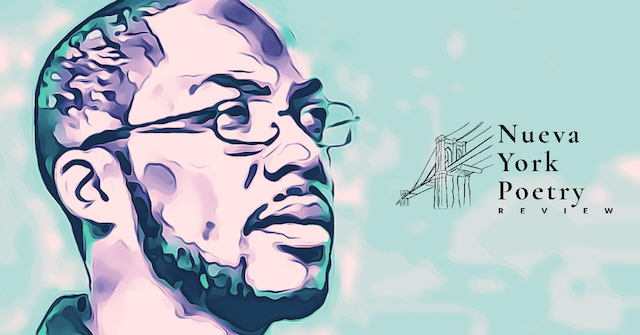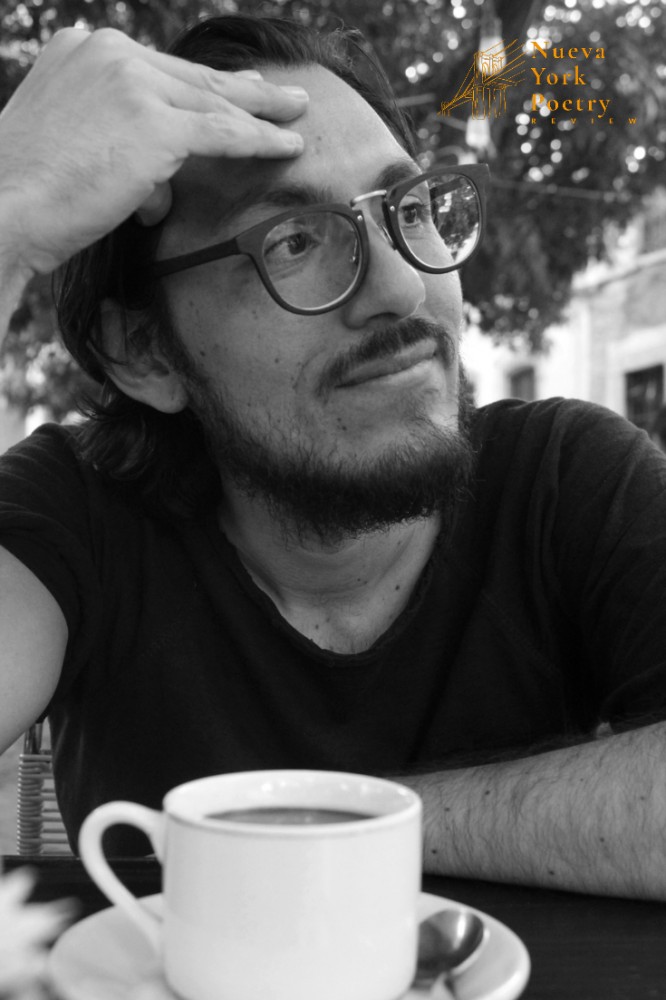
Richard Georges es un joven escritor caribeño nacido en Trinidad y Tobago; actualmente reside en las Islas Vírgenes Británicas. Es autor de los libros de poesía Haz de todos nosotros islas (Shearsman Books, 2017), Gigante (Platypus Press, 2018) y Epiphaneia (Out-Spoken Press, 2019). Este último fue merecedor del prestigioso Premio Bocas OCM de Literatura Caribeña 2020, auspiciado desde hace una década por la corporación One Caribbean Media Limited, en el marco del Festival de Literatura Bocas celebrado en Puerto España. A diferencia de su primer libro, inscrito en una poética de corte histórico, enfocada en el tema de la esclavitud, Epiphaneia es una apuesta por un tono íntimo en torno al hogar, la identidad y, sobre todo, la experiencia de los huracanes. Es aquí donde Richard Georges se vuelve sorprendente y conmovedor, en su capacidad de ver más allá del lugar común en torno al desastre (la ironía, el coraje o la narración de los daños). Georges logra encontrar la belleza, la nostalgia y maneras de ver las tormentas tropicales no como desastres sino como parte cotidiana de nuestra existencia caribeña. Creo que en estos tiempos llenos de incertidumbre y dolor que nos han tocado vivir, la poesía de Richard Georges es necesaria y vital, una bocanada de aire fresco que nos alienta a seguir.
Los siguientes poemas pertenecen al libro Epiphaneia (Out-Spoken Press, 2019).
Richard Georges is a young Caribbean writer born in Trinidad and Tobago; nowadays he lives in the British Virgin Islands. He is author of the poetry collections Make Us All Islands (Shearsman Books, 2017), Giant (Platypus Press, 2018) and Epiphaneia (Out-Spoken Press, 2019). The latter deserved the prestigious 2020 OCM Bocas Prize for Caribbean Literature, sponsored for a decade now by the corporation One Caribbean Media Limited, in the frame of the Bocas Lit Fest held in Port of Spain. Unlike his first book, inscribed in a poetic of history, focused on slavery, Epiphaneia is a bet on an intimate tone around home, identity and, above all, the experience of hurricanes. It is here that Richard Georges becomes outstanding and poignant, in his ability to see beyond the common place around disaster (irony, courage, or the narrative of damage). Georges manages to find beauty, nostalgia and ways of seeing tropical storms not as disasters but as an everyday part of our Caribbean existence. I believe that in these times full of uncertainty and pain, Richard Georges’ poetry is necessary and vital, a breath of fresh air that encourages us to continue.
The following poems appear in Epiphaneia (Out-Spoken Press, 2019)
NAVEGACIÓN DE ESTIMAS
Dicen que los pájaros siempre encuentran su camino a casa
pero casa es ninguna parte, un recuerdo; algo que nunca fue.
¿Acaso las alas recuerdan los espacios en el aire
como nosotros haríamos con un lugar? ¿Un campo de arroz?
¿Cómo volar de vuelta hacia eso? Lejos
de un túmulo de miedos, este lugar anhelando por ti…
Hace algunos años, dejé flores brillantes
en la tumba de mi abuela. Años antes, veo
las cenizas de mi abuelo ser llevadas
por los surcos del viento en las islas Bocas.
No soy yo mismo ni nunca he sido
algo que comprenda al sol
y otros objetos brillantes, celestes,
pensando: esto es un tapiz en órbita
alrededor de mí. Estoy completamente convencido
que somos las últimas criaturas en descubrir
cómo estar en el mundo. Mi barba crece salvaje.
Mis hijas pasan junto a mí en la oscuridad.
Sus voces parlanchinas llenan mis oídos
luego mi pecho y no puedo contenerlo más.
Siempre estoy volviendo a casa.
DEAD RECKONING
They say birds always find their way back home
but home is a nowhere — a memory; a never was.
Do wings remember spaces in the air
the way we might a place? A field of rice?
How do you fly back to that? Away from
a tomb of fears, this place yearning for you…
Some years ago, I lay bright flowers on
my grandmother’s grave. Years before, I see
my grandfather’s ashes taken by the
furrowing wind in the Bocas islands.
I am not myself nor have I ever been
something apprehending the sun
and other bright celestial objects
thinking: this is a tapestry in orbit
around me. I am completely convinced that
we are the last creatures to discover
how to be in the world. My beard grows wild.
My children brush past me in the darkness.
Their chattering voices fill my ears and
then my chest and I cannot hold it in.
I am always coming home.
DEL RECORDAR O SUEÑOS DEL RECORDAR
Estoy olvidandome. Me olvido de mí mismo
en las ondulantes cañas, a la rodilla, maravillosas,
estático y absorto. Había una desfiladero en Caroni donde miré
alguna vez, estaba lleno de un radiante
caimán , su espalda plagada de crestas filosas como dientes
que amenazaban el cielo. Olvido si estos recuerdos
son sueños, (no sé en cuál debería confiar más).
En un arroyo, mi padre y mi hermano mueven
una serpiente dormida. Un árbol se ha desplomado en el camino,
mi padre y mi hermano deben moverlo bajo la lluvia.
Entro a un cuarto. Prendo la luz. Una tarántula se sienta
en mi cama, pelos negros erizados bajo el halógeno.
Me pide que me siente. Me siento. Eleva sus patas de extremos oxidados
como si me interrogara, ¿estoy en casa?
ON REMEMBERING, OR DREAMS OF REMEMBERING
I am forgetting myself. I forget myself
in the rolling cane, knee high and wondrous,
ecstatic and lost. There was a ravine in Caroni I peered
into once, it was filled with a gleaming
alligator — its back full of ridges sharp as teeth
threatening the sky. I forget if these memories
are dreams, (I don’t know which I should trust more).
In a torrent, my father and brother move
a sleeping snake. A tree has fallen in the way,
my father and brother must move it in the rain.
I enter a room. Turn on a light. A tarantula sits
on my bed, black hairs bristling in the halogen.
He bids me sit. I sit. He raises two rust-tipped legs
as if in question — am I home?
NATURALEZA MUERTA DE UNA RUINA
a David Knight Jr.
Hay una casa modesta en Huntum’s Ghut,
verde, blanca, de dos pisos y sin techo,
sus angostas persianas se han ido, una apertura
donde el patio estaba, y sólo queda puro aire
donde trofeos, libros y fotografías de los niños
deberían de estar. Sin embargo, en medio de la ciudad deshecha
hay esperanza como retoños verdes que se abren camino
a través del escombro y el lodo. Y ahora los pájaros
están cantando y giran como papalotes, el sol todavía una estrella,
y nosotros todavía estamos aquí: piedras rodeadas de azul.
Mi amigo dice buenasnoches, las colinas están oscuras
y tranquilas, campos alineados de árboles desnudos
como cerillos. Pero esta casa magra, sin techo
y destripada, luce su única puerta todavía colgante,
acogedora. Desafiante, no se la llevó el viento.
STILL LIFE OF A RUIN
for David Knight Jr.
There is a modest house in Huntum’s Ghut,
green and white and two-storied and roofless,
its narrow louvers gone, an aperture
where the patio was, and just clean air
where trophies, books, pictures of the children
should be. Still, amidst the crumbling city
there is hope like green shoots pushing up through
the rubble and mud. And now the singing
birds loop like kites, the sun remains a star,
and we are still here — rocks circled by blue.
My friend says goodnight, the hillsides are dark
and peaceful, fields lined with their naked trees
like matchsticks. But this meagre house, roofless
and gutted, vaunts its one door still hanging,
still welcoming. Unblown and defiant.
Richard Georges (Port of Spain, Trinidad & Tobago, 1982), is a writer of essays, fiction, and three collections of poetry: Epiphaneia (Out-Spoken Press, 2019), Giant (Platypus Press, 2018) and Make Us All Islands (Shearsman Books, 2017). His work has appeared in Prelude, Smartish Pace, The Poetry Review, WILDNESS, Wasafiri, The White Review and elsewhere. In addition to writing, Richard is a founding editor of Moko, and a Fellow of the Stellenbosch Institute of Advanced Study. He works in higher education and lives in the British Virgin Islands.
Richard Georges (Puerto España, Trinidad y Tobago, 1982), es escritor de ensayos, narrativa y tres libros de poesía: Epiphaneia (Out-Spoken Press, 2019), Gigante (Platypus Press, 2018) y Haz de todos nosotros islas (Shearsman Books, 2017). Su trabajo ha sido publicado en Prelude, Smartish Pace, The Poetry Review, WILDNESS, Wasafiri, The White Review entre otras publicaciones. Además de escribir, es editor y fundador de la revista Moko, así como becario del Instituto Stellenbosch de Estudios Avanzados. Trabaja en educación superior y vive en las Islas Vírgenes Británicas.

David Anuar (Cancún, Q. Roo, 1989). Licenciado en Literatura Latinoamericana (UADY, 2013) y maestro en Historia (CIESAS, 2018). Becario del PECDA (2012, 2015) y de la Fundación para las Letras Mexicanas (2018-2020). Ha traducido poemas del escritor ghanés Joe de Graft, del caribeño Lasana M. Sekou, así como la Canción de amor de J. Alfred Prufrock de T.S. Eliot. Editor de la antología Contramarea. Breve antología de poesía joven de Quintana Roo (Plataforma Colectiva, 2017), y de la obra completa de Adriana Cupul Itzá, Y mi cuerpo no ha muerto. Poesía recuperada (IMCAS, 2019).
David Anuar (Cancun, Q. Roo, 1989). BA in Latin American Literature (UADY, 2013) and MA in History (CIESAS, 2018). Fellowship of PECDA program (2012, 2015) and at Fundación para las Letras Mexicanas (2018-2020). He has translated poems of the Ghanaian writer Joe de Graft, of the Caribbean Lasana M. Sekou, and The Love Song of J. Alfred Prufrock by T.S. Eliot. Anuar is the editor of the anthology Countertide. Brief Anthology of Young Poets from Quintana Roo (Plataforma Colectiva, 2017) and Adriana Cupul Itzá’s collected poems My Body Hasn’t Died. Recovered poetry (IMCAS, 2019).